MAGIC at 90: The Show Continues to Be a Draw for Contemporary, Streetwear Brands
- Oops!Something went wrong.Please try again later.
- Oops!Something went wrong.Please try again later.
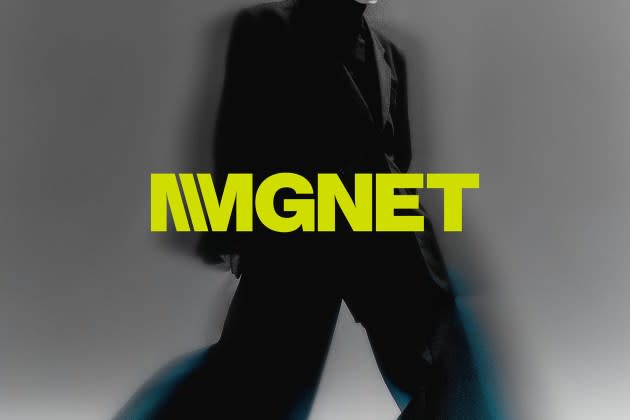
LAS VEGAS — The past and the present converged at MAGIC/Project here last week as the trade show served up a wide assortment of contemporary men’s brands on what was being celebrated as its 90th anniversary.
The show, an acronym for Men’s Apparel Guild in California, got its start in 1933 in Palm Springs, Calif., moved to Los Angeles and then to Las Vegas, where it now hosts twice-yearly events. MAGIC has since expanded beyond men’s to encompass womenswear, footwear, accessories and sourcing.
More from WWD
Linen, Quiet Luxury and Headwinds: Textile-makers Brace for Uncertain Year
Diversity and Fashion Focus Sign SIL's 60th Anniversary Edition
Now owned by Informa plc, a publicly held U.K.-based company with hundreds of brands across a variety of industries, the February edition of the show also served to introduce the fashion division’s new branding as Mmgnet Group. The name is intended to reflect the company’s focus as a matchmaker for the exhibitors and retailers it attracts across its portfolio.
The rebranding launched just prior to the show so its impact appeared minimal in Las Vegas, but Kelly Helfman, president of Mmgnet Group, said there was nonetheless an expanded push to connect the varied parties at the men’s, women’s and sourcing shows through educational seminars and other matchmaking opportunities.
All told, Helfman said the attendance at the show was up from last time — she did not provide figures — along with the exhibitor count. Project showcased more than 500 brands and the MAGIC Men’s section offered 230 brands, an increase of 25 percent for the MAGIC section. “That’s where it all started,” she said. About 17 percent of the exhibitors were international, with Canada, France and Turkey bringing the largest contingents.
Among those exhibiting were a number of new and returning brands including Beverly Hills Polo Club, Esprit, 7 Diamonds, Psycho Bunny, Pendleton and Johnny Q, Helfman said, adding that the men’s show also attracted DTLR, Nordstrom, American Rag and other large retailers.
She said the educational panels were strongly received, including one session featuring four NFL players tackling the subject of the increased importance of fashion in sport. Speakers included Jeremiah Owusu-Koramoah, linebacker for the Cleveland Browns, who was recently named GQ’s most stylish player for his African-inspired wardrobe.
During the panel discussion, Owusu-Koramoah said he seeks out brands that reflect his heritage as well as his individuality. That was the case for other players as well, including Keion White, defensive end for the New England Patriots, who was wearing an elaborate Valentine’s Day-themed sweater that he purchased from a small Black-owned brand. He said that while other athletes may opt to wear pieces from well-known luxury houses, he prefers to support small brands. “There’s nothing wrong with designer brands,” he said, “but I prefer to give my money to the smaller people.”
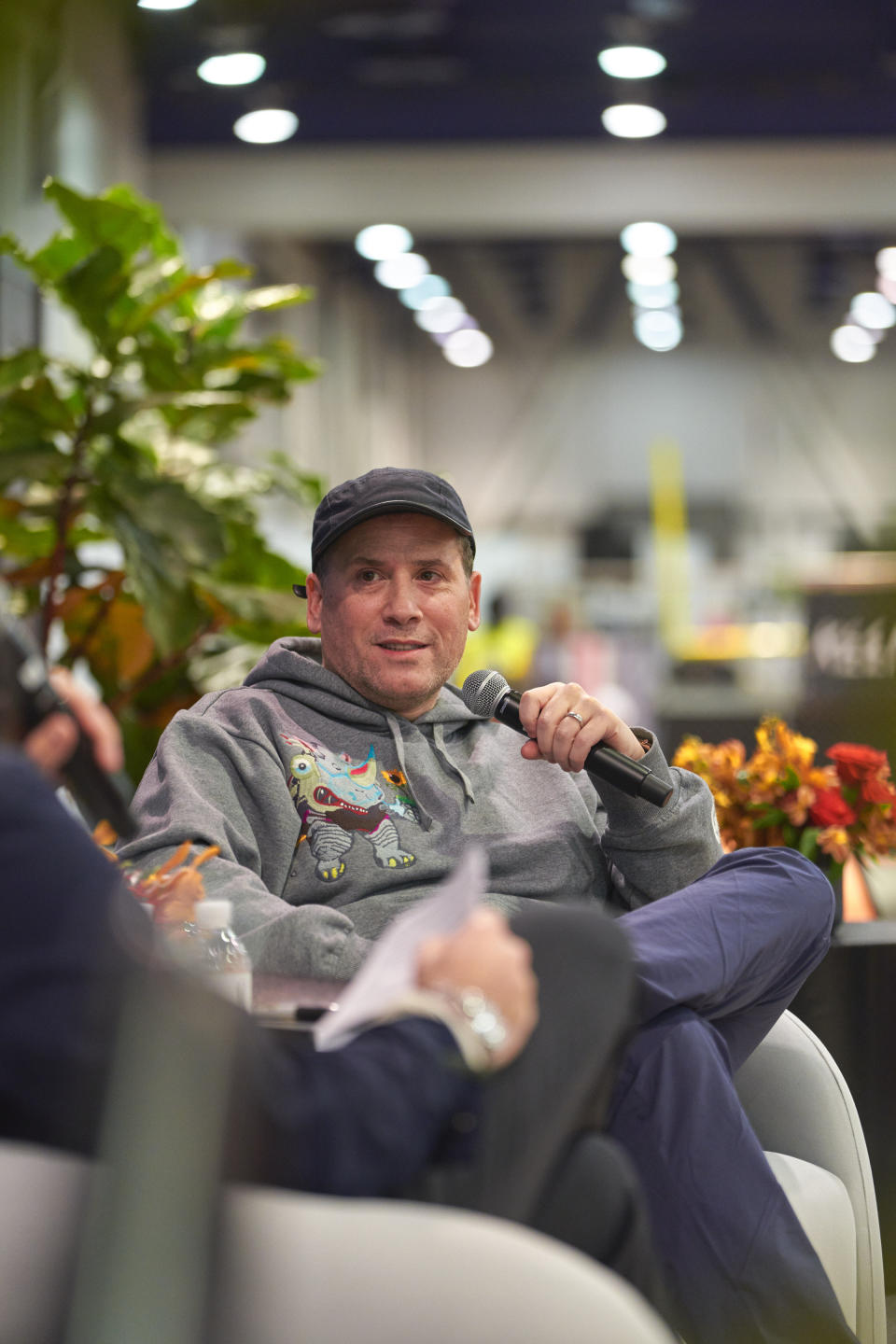
In addition to the NFL panel, the show hosted a conversation with Marc Ecko, who was celebrating the 30th anniversary of his brand.
Ecko, who now focuses on philanthropic efforts, returned to the company to design a limited-edition capsule collection tied to the anniversary.
At the show, he reminisced on the start of his brand and how important the MAGIC show was to him in the early days. “I’m having PTSD being here,” he said with a laugh, adding that at his first MAGIC, he actually painted murals live on the floor and sold them since his airbrushed apparel pieces didn’t attract much interest.
Calling himself a “re-designer, not a designer,” Ecko said he abandoned his studies to become a pharmacist at Rutgers University to embrace his talent as an artist, leaning into those airbrushed pieces that eventually found a following and led to the creation of Ecko Unltd.
He said at that time, hip-hop was emerging as a force and his line was embraced by that community, which fueled its success.
Ecko said that while he experienced many ups and downs with the business over the years, he ultimately persevered by “trusting my gut” and remaining “authentic, vulnerable and accessible.”
“A lot of fashion is fiction, built on story and illusion, but I’ve always tried to be earnest.”
Ecko’s anniversary capsule, Dear1993.art was among the brands on display at the show.
Here, a look at that brand as well as a few other highlights from men’s at Project and MAGIC.
Brand: Ecko Unltd.
Backstory: The brand created by Marc Ecko is now owned by Iconix Group. The founder, who also created Complex, sold the company in 2009, but returned last year to create a special limited-edition capsule called Dear1993.art, which is marketed as a “love letter” from its creator. Only 93 units of each piece were manufactured, and all were signed and numbered. To complement that collection, the company also offered a reissued assortment of top pieces from the line through the years.
Key pieces: Ecko said for Dear1993, he “didn’t want to be overly sentimental,” and rather than just reworking his hits, he designed an entirely new collection. Hoodies were a key part of the line along with T-shirts featuring the brand’s signature design codes such as its rhino motif and graffiti graphics. The company’s reissued line includes heavy cotton hoodies and melton varsity jackets with raised chenille appliqués, original labels and trim also highlighting the rhino logo. A top piece was a hoodie adorned with a variety of graffiti tags.
Retail prices: The reissued collection sells for $98 to $128 and the Dear1993 is $180 to $260.
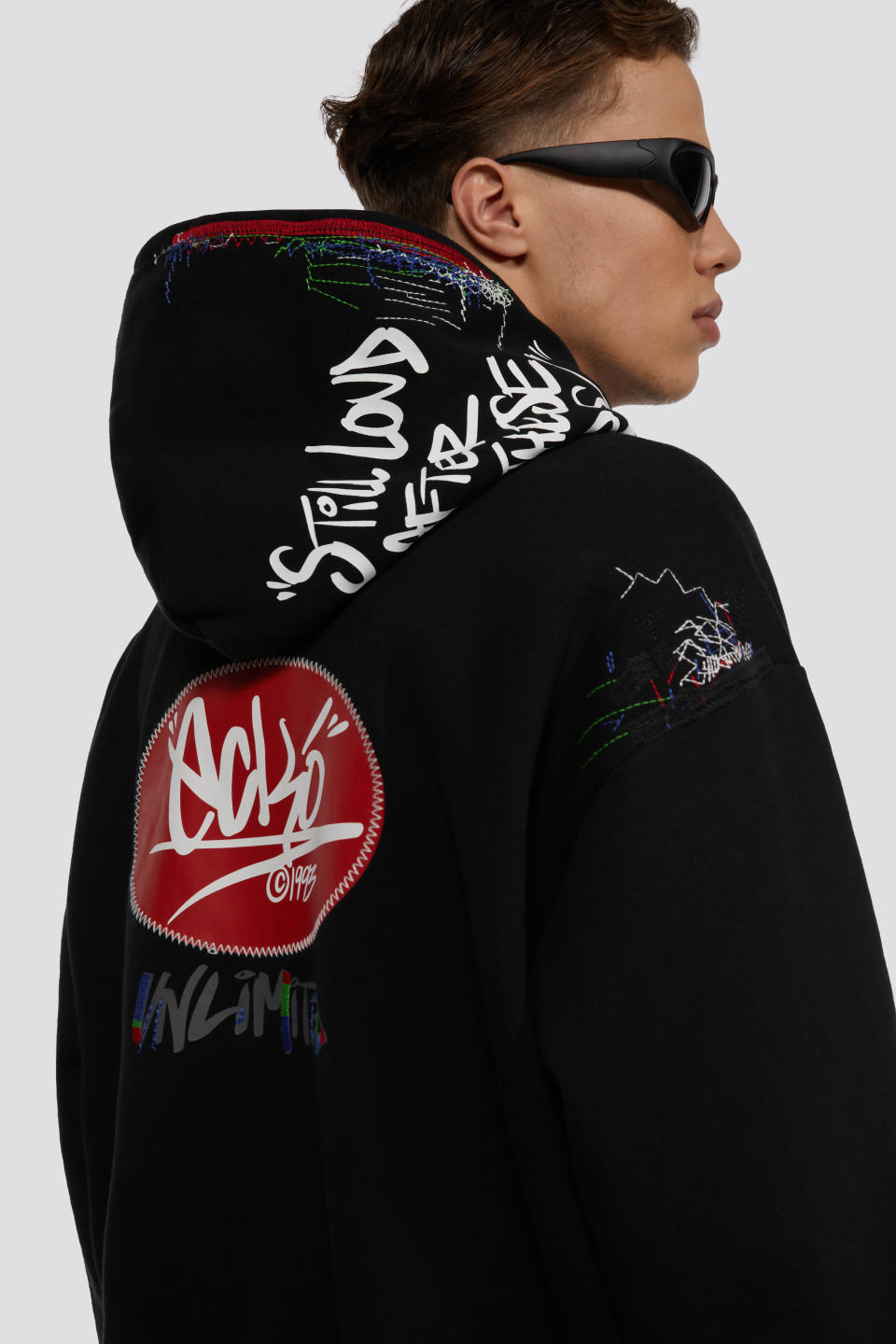
Brand: Alpenhaus
Designer: Alan Pivovar
Backstory: The Canadian outerwear brand owned by Thread Collective is launching for fall and its focus is to offer updated pieces made from sustainable materials at a more accessible price than its better-known competitors. It touts in its marketing materials: “Alphenhaus outerwear embodies a space that pushes the boundaries of fashion and function with its distinctive, durable design, high-quality fabrics and bold colorways.” said Pivovar, who worked for Rudsak as well as Dolce & Gabbana before joining Alpenhaus, said his goal is to “build something different,” targeted to customers who are seeking conscious designs.
Key pieces: A white puffer with a red zip-out placket and hood and a black panel on the back with the brand name was a standout piece. Another jacket with zip-off sleeves to create a vest was also unique. All the pieces in the collection feature a triangle patch intended to reference a mountain peak and are created with Eco-Puff, which is made from plastic bottles.
Retail prices: The line ranges from $395 to $699. “The tide is changing,” said Danielle Marion, account manager. “People don’t want to pay over $1,000 for a jacket. Alpenhaus offers what we call ‘opening aspirational’ pricing.”
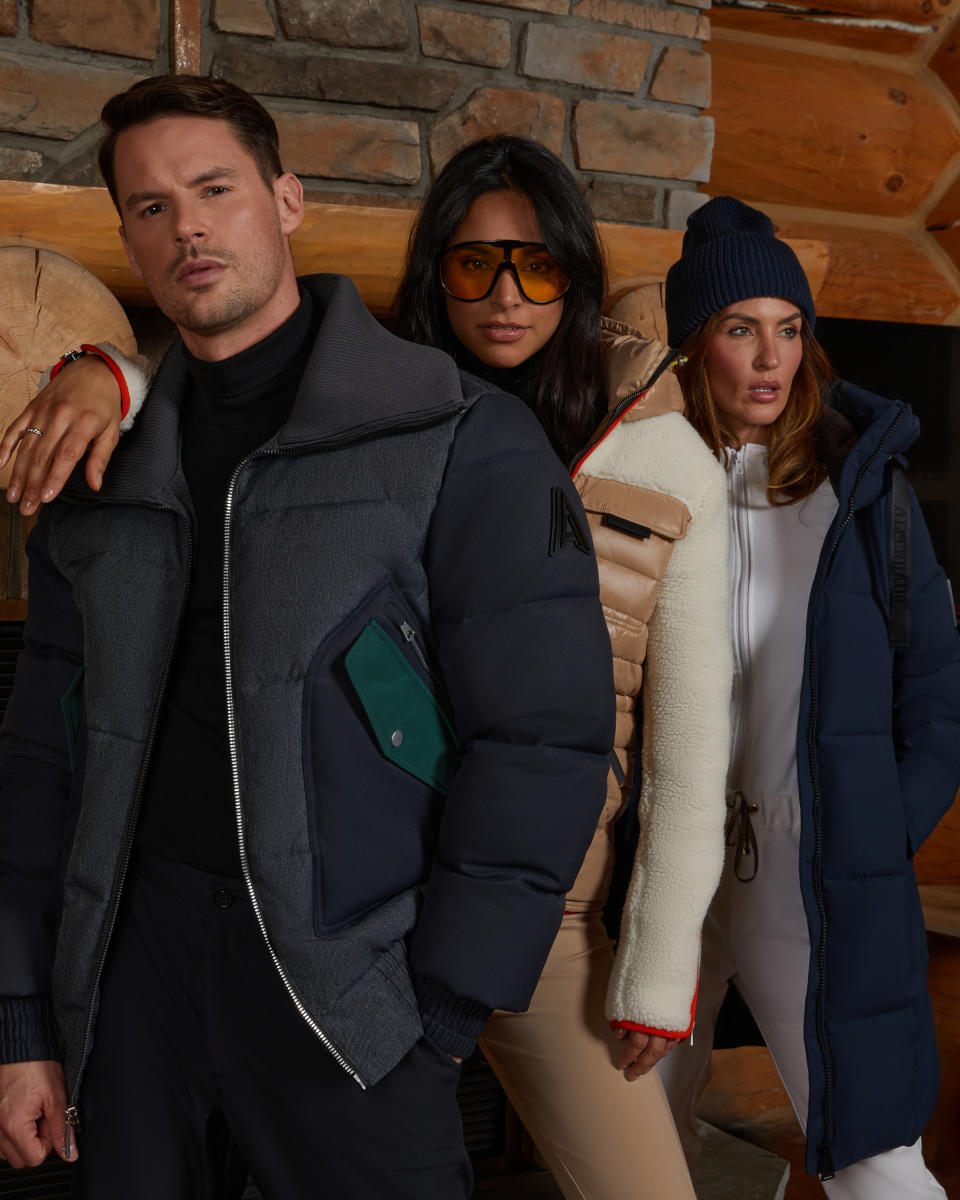
Brand: Frank and Oak
Backstory: The company started as a direct-to-consumer men’s shirt label in Montreal 12 years ago and has since expanded into a full lifestyle brand for both men and women. Its focus is to “inspire a better way of living,” the company’s website says, “by creating conscious products that last through time.” It is now a certified B Corp and everything in its assortment contains either low impact, cruelty free, organic, biodegradable or recycled fibers. Frank and Oak took the plunge into wholesale this past year and Mathieu Gagne, head of wholesale for the company, said embracing a “more traditional way of trading” will allow the brand to expand its reach and customer acquisition abilities.
Key pieces: For the fall collection, key pieces continued to tell the sustainability story including crewneck and turtleneck boucle sweaters in solids and patterns made out of Seawool, a material created from crushed oyster shells and plastic bottles. There were also sweaters made from yak fur, which Gagne called a “sustainable option to cashmere,” and plaid shirts made from kapok, a breathable, thermoregulating fiber that is an alternative to cotton, as well as a circular denim collection crafted from conscious materials and salvaged fibers with no rivets and workwear-inspired details.
Retail prices: Jeans sell for $99, pants for $98 to $119, T-shirts for $49, shirts for $89 to $119 and sweaters for $129.
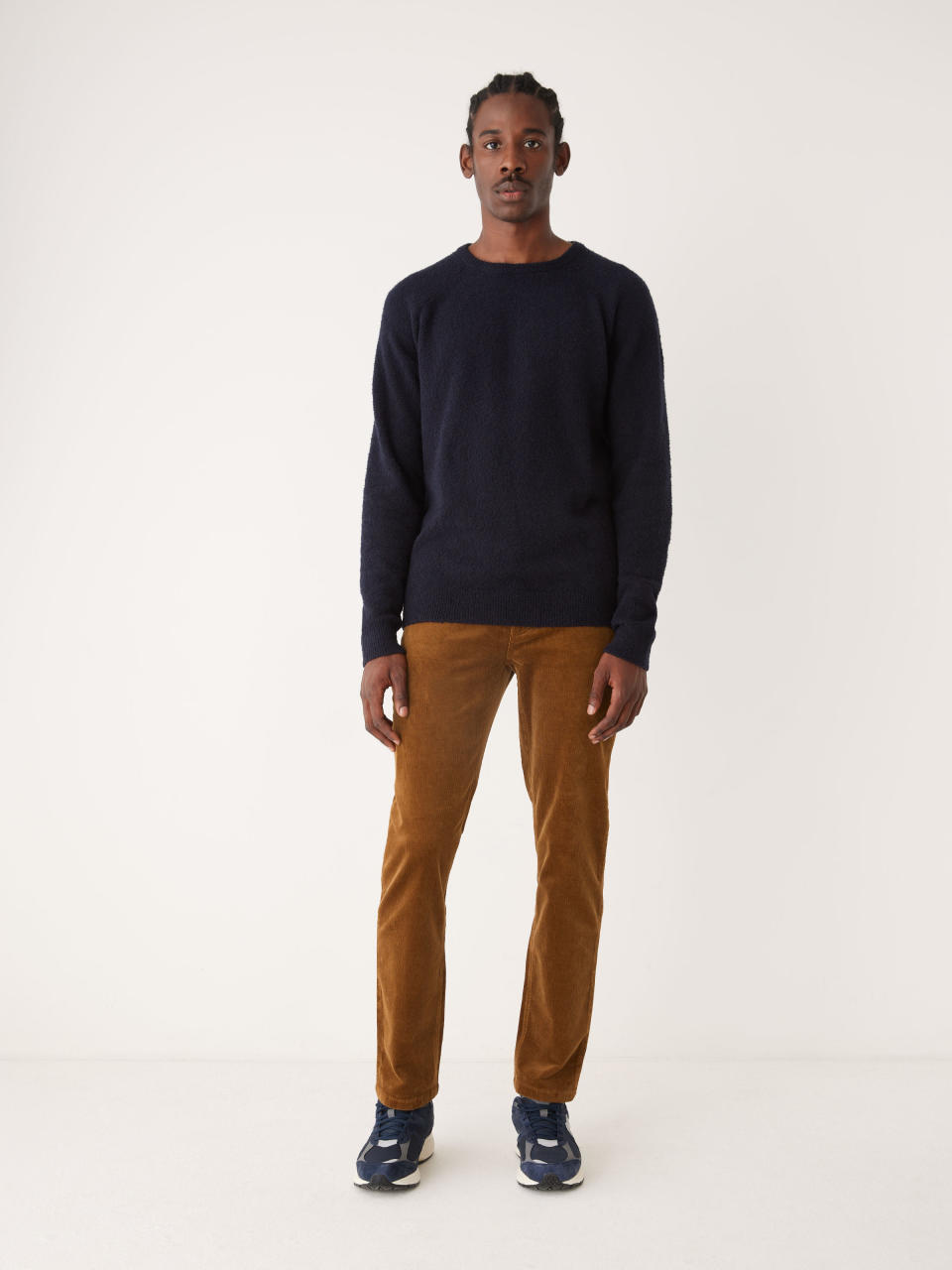
Brand: Flag & Anthem
Designer: Jong Lee and Nathan Nelson
Backstory: The eight-year-old company was founded by former Macy’s and Lord & Taylor executives Azod Mehit and Brad Gartman as a casual men’s brand offering “real clothes for real life.” Think plaid shirts, graphic T-shirts, jeans and other vintage-inspired sportswear. Recently it has expanded its reach into performance wear, the category that Mehit said is “the hottest thing right now.” By offering a range of merchandise that spans “from rugged to refined,” Mehit said the company can lean into whatever products are most popular at any given time. “It’s nice to be diversified and not have to rely on one category,” he said. Flag & Anthem counts a number of well-known ambassadors including country singer Dierks Bentley and football player Christian McCaffrey. Most recently it signed golfer Keegan Bradley to help promote its new golf collection.
Key pieces: The performance wear offering includes shirts and pants with stretch, moisture wicking and UPF features and sweaters made from cooling yarns. Knit shirts in “polished, refined” patterns and quarter-zips are also popular.
Retail prices: The collection offers “approachable pricing,” Mehit said, with shirts retailing for $58 to $68, jeans for $69, sweaters for $59 to $79 and outerwear for $80 to $120.
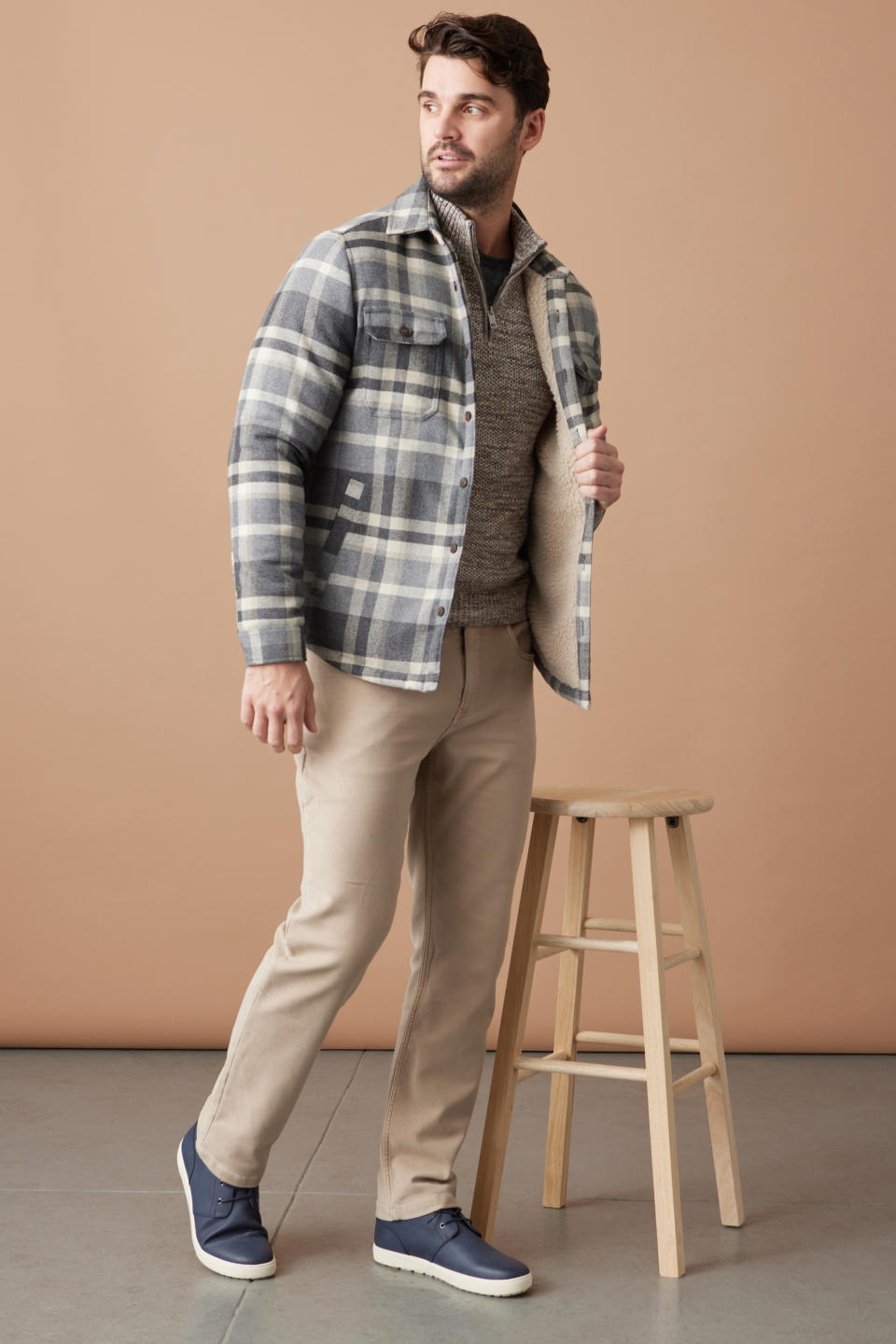
Brand: Untuckit
Backstory: The brand cofounded in 2011 by Chris Riccobono to sell shirts designed to be worn untucked has grown into a $200 million-plus company with 85 stores around the U.S. and a robust direct-to-consumer business. “But you can’t be a $1 billion brand without wholesale,” Riccobono said of the company’s entry into wholesale at Project. Although Untuckit had tested the waters with Macy’s and Destination XL, Riccobono believes it’s time for a full-on press to expand that part of the business. His goal is to lure a large number of independent specialty stores seeking a new option for button-down shirts, polos, Henleys, sweaters, jackets and pants. “Retail has really been the backbone of our company since 2015. It’s a strategy we strongly believe in because customers love experiencing our products in person,” Riccobono said. “We’re committed to bringing the Untuckit experience to everyone in America, and showing at Project Las Vegas will be the first step in finding the right retail partners to help us achieve that dream.”
Key pieces: The wrinkle-free and performance button-downs offered in a variety of patterns and solids remain the backbone of the brand. But flannels, shirt-jackets, Henleys, vests and lightweight outerwear are finding fans. Merino wool quarter-zips and full zips are part of the offering along with the water-resistant traveler tech pant in two-way stretch polyester in four colorways.
Retail prices: Button-downs are $105, polos are $79.50, pants are $108, Henleys are $69.50 and sweaters are $99.50.
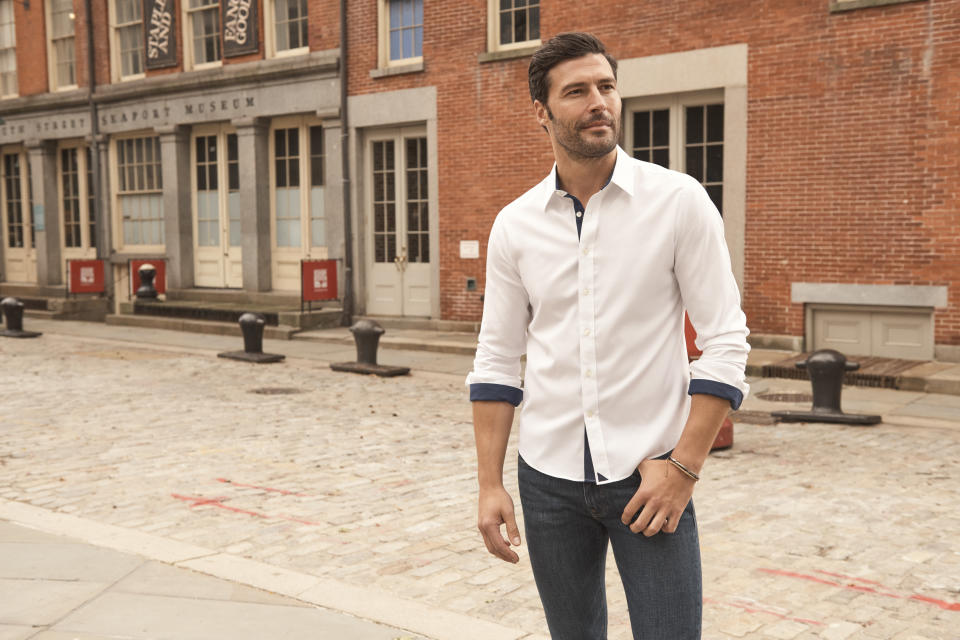
Brand: Leisure Lab
Designer: Daniel Henson
Backstory: The five-year-old Los Angeles-based brand is completely made in America at the company’s own factory in its home city. This allows it to quickly design and manufacture trend-right product instead of having to wait months for shipments to arrive from overseas. “We can create a sample in one day,” Henson said. Although the brand is primarily direct-to-consumer, it is seeking to expand via the wholesale route. “We now have a good grasp on our manufacturing and know we can scale in a sustainable way,” he said. “A lot of other brands overproduce, but we can make things on a smaller scale.”
Key pieces: A farmer’s chore jacket in a checkerboard pattern, which the brand calls the “checkmate,” is a strong piece along with heavy cotton ripstop pants offered this season in a camo pattern. There’s also a “zen capsule” of a hoodie or crew with matching sweatpants in soft, comfortable fabrics offered in a range of colors.
Retail prices: Shirts sell for around $50 and the checkmate jacket retails for $275.
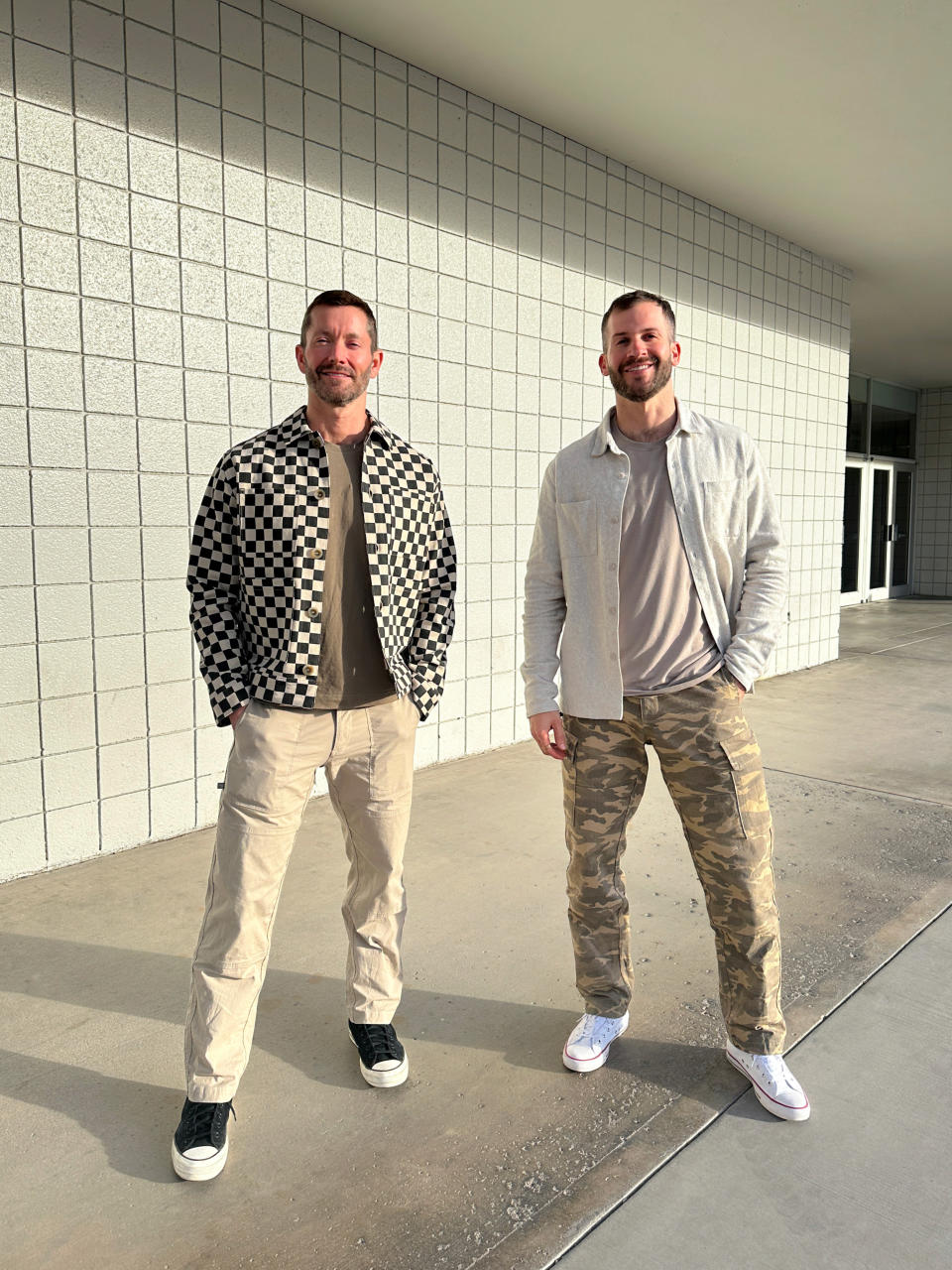
Brand: Seven for All Mankind
Backstory: The premium denim brand was founded in 2000 in Vernon, Calif., by Michael Glasser, Peter Koral and Jerome Dahan. It changed hands several times over the years and is now owned by Delta Galil. While its ownership has changed, its mission has not. The brand continues to specialize in creating sophisticated jeans for men and women, offering fabric and fit innovations with a focus on sustainability.
Key pieces: For fall, men’s jeans are offered in straight and skinny fits along with a wider-leg model in a wide variety of washes. Outside of the traditional blue jeans, the brand is finding success with a performance model in a luxe fabric that Courtney Keller, head of wholesale, said was appropriate for “desk to dinner.” It was offered in black, blue and gunmetal. There is also a ready-to-wear collection designed to complement the jeans with suede bombers, cashmere Henleys and hoodies, and, of course, denim jackets, including one lined in shearling.
Retail prices: The average price for the jeans is $200 but the range is $180 to $270. The outerwear sells for $798 to $998.
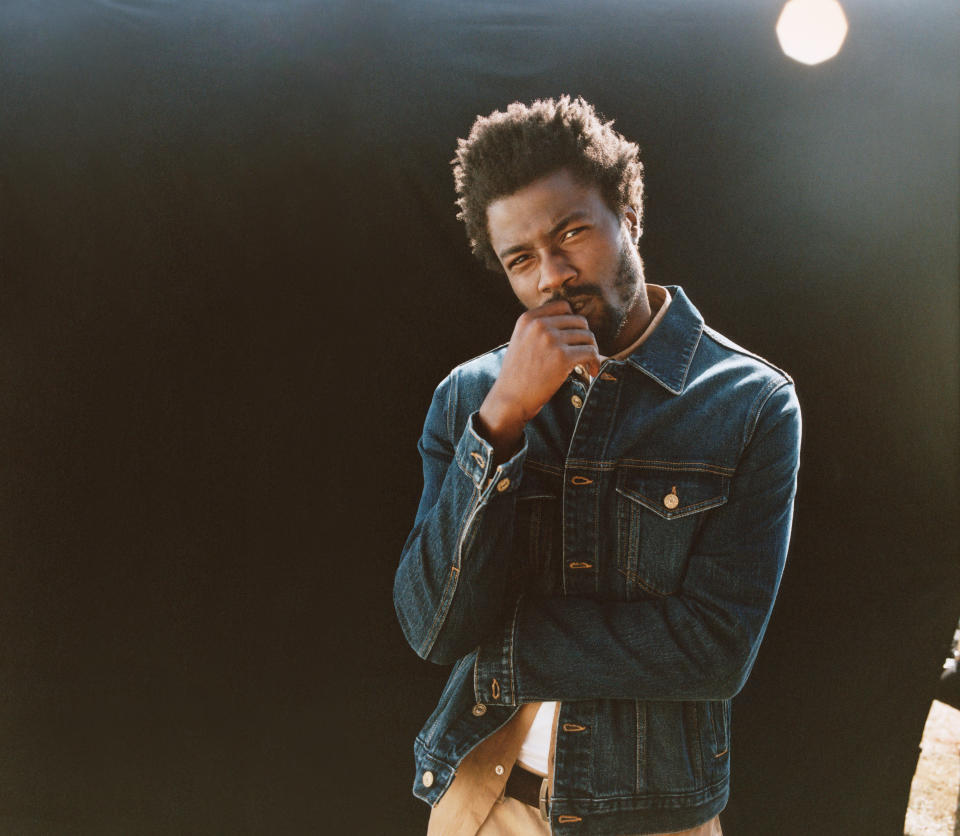
Brand: Outerknown
Designer: John Moore
Backstory: Moore and champion surfer Kelly Slater created the brand in 2015 as a company dedicated to sustainability and a commitment to the water. The goal is to offer a line of classic pieces across a variety of categories. It has also been adding to its store fleet. There are now nine Outerknown stores, with more in the works.
Key pieces: Outerknown is perhaps best known for its blanket shirts, a core layering item made from organic cotton twill with tagua corozo nut buttons that is reinvented seasonally in different colors and patterns. There is also a fleece terry hoodie, an updated military-inspired Journey jacket,Donegal sweaters made from recycled cashmere and wool, and T-shirts in regenerative organic cotton. The brand is relaunching its denim collection with models available in slim, straight and relaxed fits. The denim is cut, sewn and washed in L.A. The brand partnered with New Life Project for sustainable travel packs and accessories. And of course, there are Slater’s signature surf trunks made of post-consumer waste.
Retail prices: The blanket shirt is $168, long-sleeve wovens are $138 to $168, sweaters are $168 to $298 and the denim is $168.
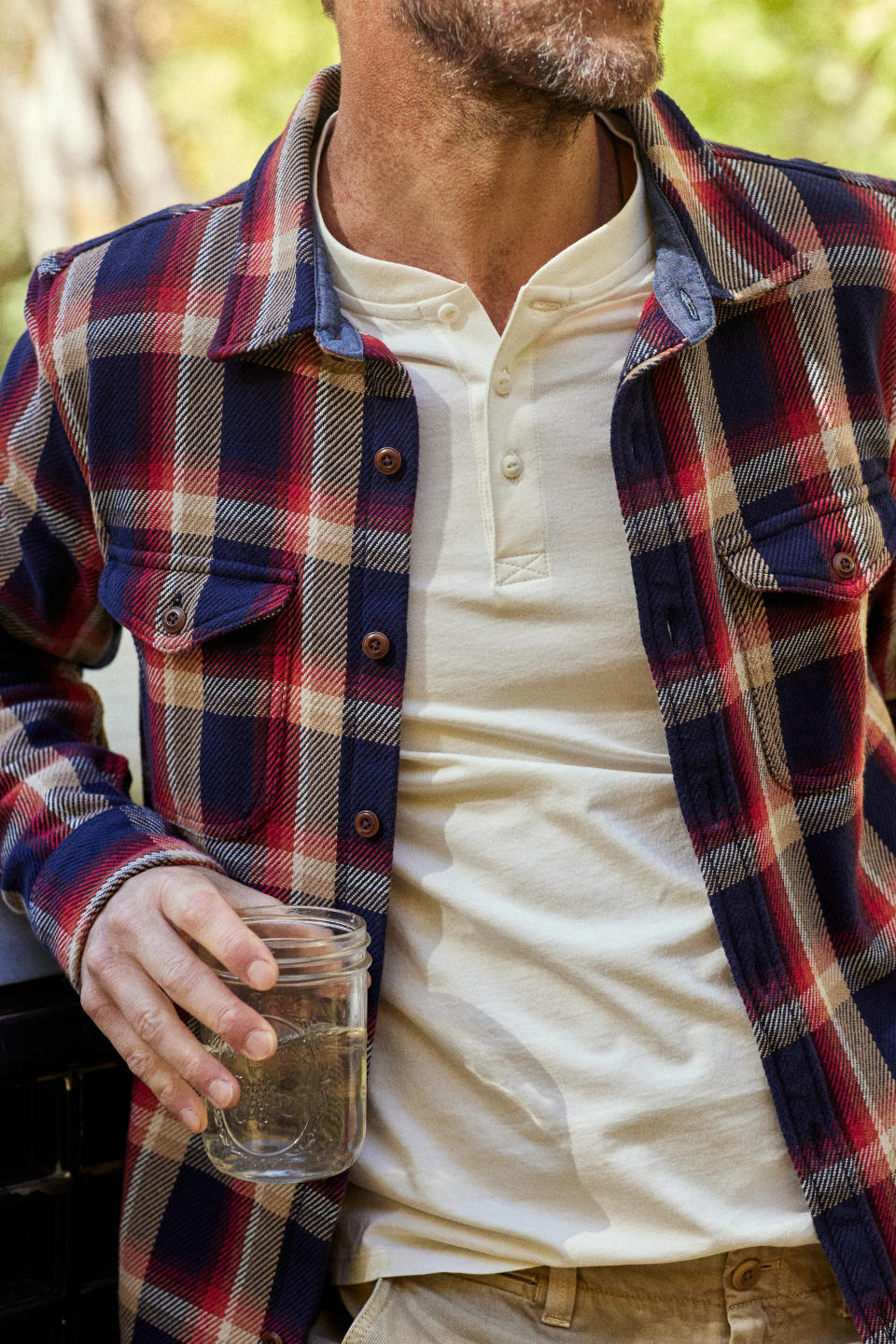
Best of WWD

